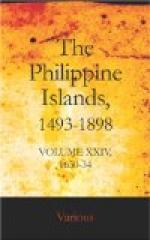He afterwards came to read at Manila, and also voted in that chapter with the title of associate to our father Fray Miguel Garcia. Our father Fray Vicente chose him as his associate, and immediately gave him the priorate of Agonoy. During the provincialate of our father Baraona, he was prior of Bulacan. During that of our father Fray Juan Enriquez he was definitor; and also, for a year and a half, prior of Manila. During the triennium of our father Mentrida, he was visitor and prior of Pasig. After that, in the contest for provincial he fell a trifle short of the required age, but was dispensed by the father master, Fray Diego del Aguila—who presided as provincial, or rather, as senior definitor. The definitors elected in that chapter were: Fray Francisco Bonifacio (the second time that he had held that office); the second, Fray Esteban de Peralta; [63] the third, Fray Jeronimo de Medrano; [64] and the fourth, Fray Alonso de Carvajal. [65] Those elected as visitors were father Fray Alonso del Rincon, and father Fray Alonso Ruiz. They made regulations for the province, and fortified it with good laws.
Our father Fray Hernando Becerra doubtless forced himself to take upon his shoulders the weight of the province on account of his love for it, and in order that it might not go into a decline—although he would have preferred to rest and to take care of his health; for he had been ailing for two years, so that he appeared to be rather the statue of death than a man. The fact that he was still young kept him alive, for that is a very important point. Although all told him that his illness was serious, and that it unfitted him for the burden of government, still he had the greatest courage that one can imagine, and accordingly was elected prior provincial, on May 2, 1626.
However, he felt better immediately after assuming his new duties, but this improvement did not last long; for he was like the candle, which does not fail to flare up when about to be extinguished. He received very good treatment, and all were diligently striving to secure his health, for it was recognized that he was the one of whom the province had need. It was feared that he would be harsh, and that he would exercise severity; for he showed that disposition, and all trembled before him—all that harshness being occasioned, perhaps, by his severe illness. But in the end those fears lasted but a little while, for on the day of our father St. Ignatius, the last of July, God took him to himself by a most comfortable death, which left all the religious envious and full of tears, so that there was no one who did not shed them at that spectacle. Two years before he had prepared himself [for death]; and, although he was always a most observant religious, he renewed that care upon seeing the pass to which he had come. The deposit which he held by permission in our order he proceeded to give to the church, dispossessing himself of everything which could prevent him from




